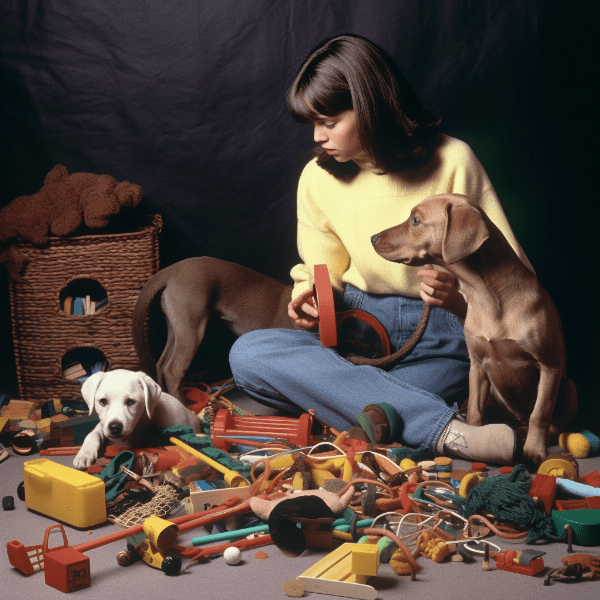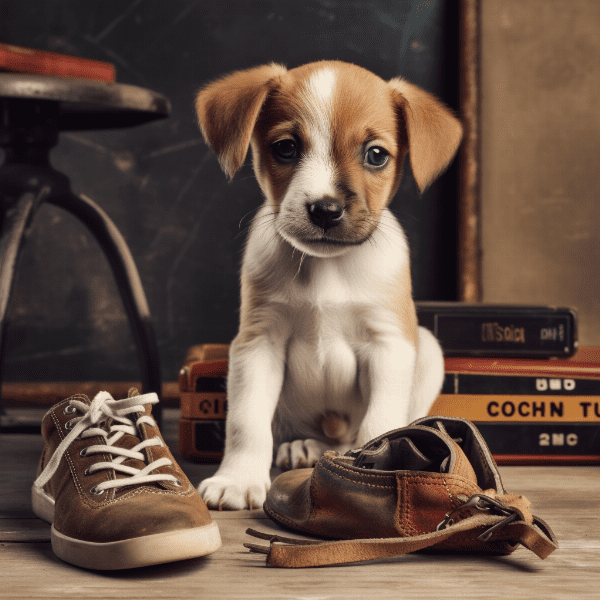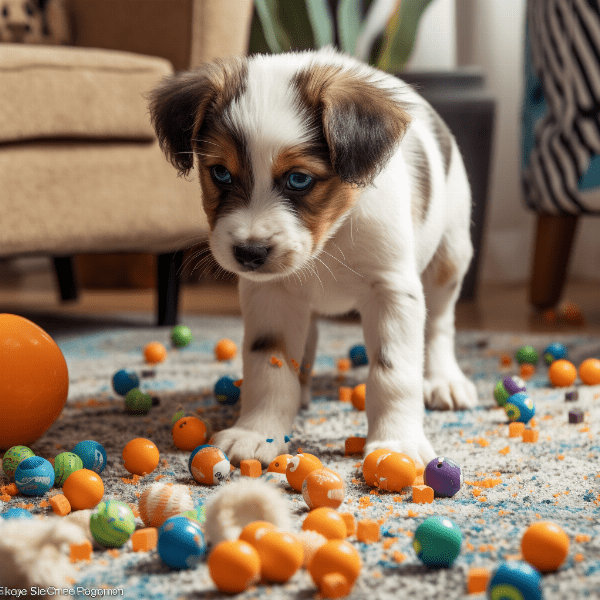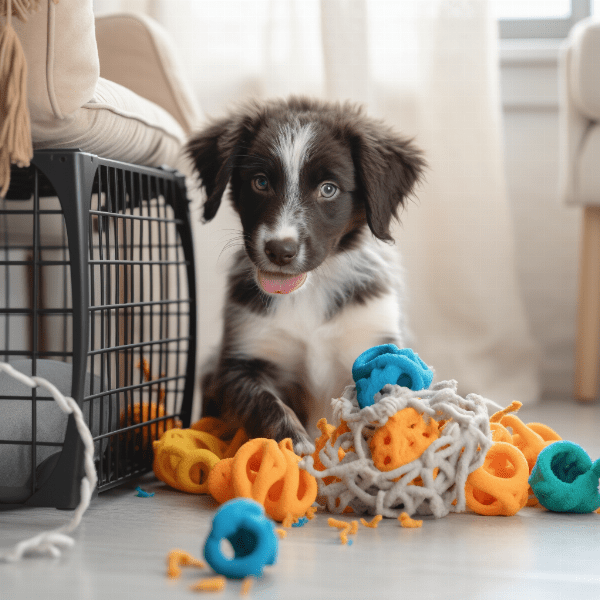Table of Contents
- Why Do Puppies Chew on Walls?
- The Risks of Letting Your Puppy Chew on Walls
- Understanding Your Puppy’s Chewing Behaviors
- Tips for Preventing Your Puppy from Chewing on Walls
- Redirecting Your Puppy’s Chewing to Appropriate Toys
- Crate Training as a Solution to Wall Chewing
- Consistency and Positive Reinforcement: Key to Success
- When to Seek Professional Help for Your Puppy’s Chewing
- Common Mistakes to Avoid When Stopping Puppy Chewing
- Conclusion: Your Puppy Can Learn to Stop Chewing Walls
Why Do Puppies Chew on Walls?
Puppies are known for their playful and curious nature. However, this curiosity can sometimes lead them to engage in destructive behaviors such as chewing on walls. Understanding the reasons behind your puppy’s behavior is essential in finding a solution to stop it.
Boredom and Lack of Stimulation
One common reason why puppies chew on walls is boredom. Puppies need a lot of mental and physical stimulation to stay happy and healthy. If they do not receive enough attention, they may become bored and start chewing on anything they can find, including walls.
Teething
Teething is another reason why puppies may chew on walls. Like human babies, puppies go through a teething phase where their teeth are growing and breaking through their gums. Chewing helps to relieve the pain and discomfort associated with this process.
Separation Anxiety
Puppies that experience separation anxiety may also resort to chewing on walls as a way to cope with their anxiety. Separation anxiety is a common condition in puppies that can occur when they are left alone for extended periods.
Exploration and Curiosity
Lastly, puppies may chew on walls simply because they are curious and want to explore their surroundings. Chewing on walls allows them to explore new textures and tastes.
It’s important to note that chewing on walls can be a serious problem for your puppy’s health and your home’s structural integrity. Understanding why your puppy is engaging in this behavior is the first step in finding a solution to stop it.
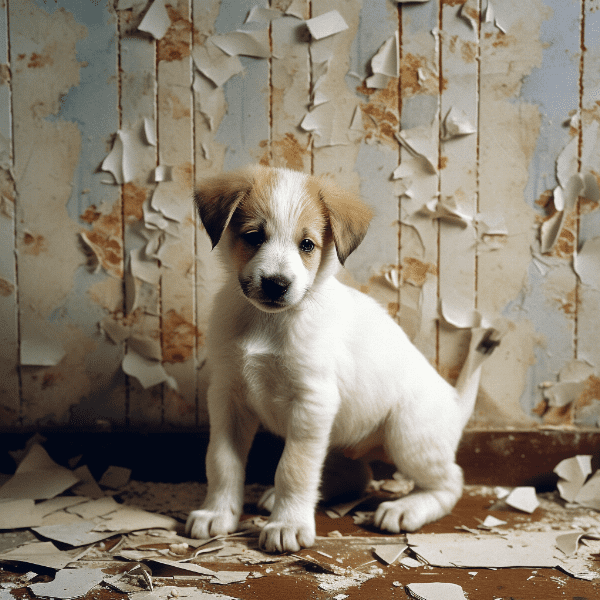
The Risks of Letting Your Puppy Chew on Walls
While it may seem harmless, allowing your puppy to chew on walls can have serious consequences for both your puppy’s health and your home’s structural integrity.
Dental Problems
Chewing on walls can cause significant damage to your puppy’s teeth. The hard surface of the walls can break or damage their teeth, leading to painful dental problems that require expensive veterinary care.
Digestive Issues
Chewing on walls can also be dangerous for your puppy’s digestive system. The paint, plaster, or drywall they ingest can cause blockages in their digestive tract, leading to serious health problems that require immediate veterinary attention.
Home Damage
Allowing your puppy to chew on walls can cause significant damage to your home’s structural integrity. Prolonged chewing can weaken the walls, making them more susceptible to collapse or other serious issues.
Risk of Electrocution
If the walls your puppy chews on contain electrical wires, they may be at risk of electrocution. Chewing on electrical wires is extremely dangerous and can cause serious injuries or even death.
As a responsible pet owner, it’s crucial to take action to prevent your puppy from chewing on walls. Not only can it lead to costly veterinary bills and home repairs, but it can also put your puppy’s health and safety at risk.
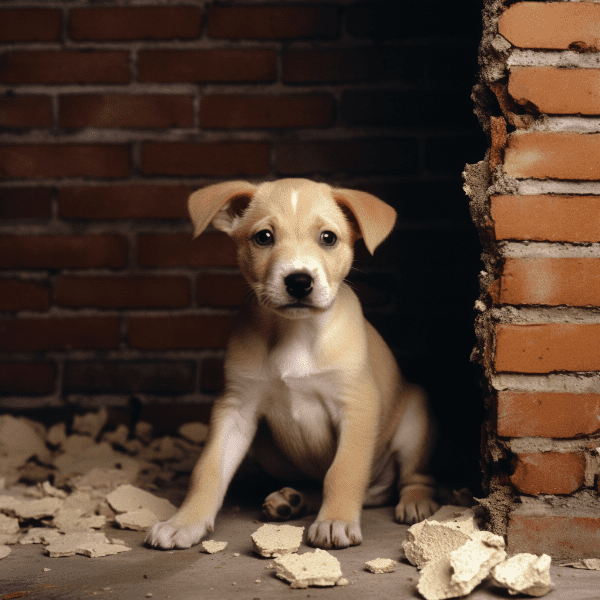
Understanding Your Puppy’s Chewing Behaviors
Before you can stop your puppy from chewing on walls, it’s essential to understand their chewing behaviors.
Normal Chewing vs. Destructive Chewing
It’s important to note that chewing is a natural behavior for puppies. It’s how they explore their surroundings and relieve stress. However, there’s a significant difference between normal chewing and destructive chewing. Normal chewing involves the Puppy chewing on appropriate items, such as toys and bones, while destructive chewing involves them chewing on inappropriate items, such as walls or furniture.
Signs of Stress or Anxiety
Puppies may resort to destructive chewing as a way to cope with stress or anxiety. If your puppy is chewing on walls excessively, it may be a sign that they are experiencing some form of stress or anxiety. Other signs of stress or anxiety in puppies include panting, pacing, whining, and restlessness.
Age and Breed
The age and breed of your puppy can also play a role in their chewing behavior. For example, teething puppies may chew more frequently and intensely than older dogs. Additionally, certain breeds, such as retrievers and terriers, may be more prone to chewing due to their high energy levels and natural instincts.
Time of Day
Lastly, the time of day can also influence your puppy’s chewing behavior. Puppies may be more likely to chew when they are left alone for extended periods or at night when they are more active.
Understanding your puppy’s chewing behaviors can help you develop a strategy to prevent destructive chewing and keep your puppy safe and happy.
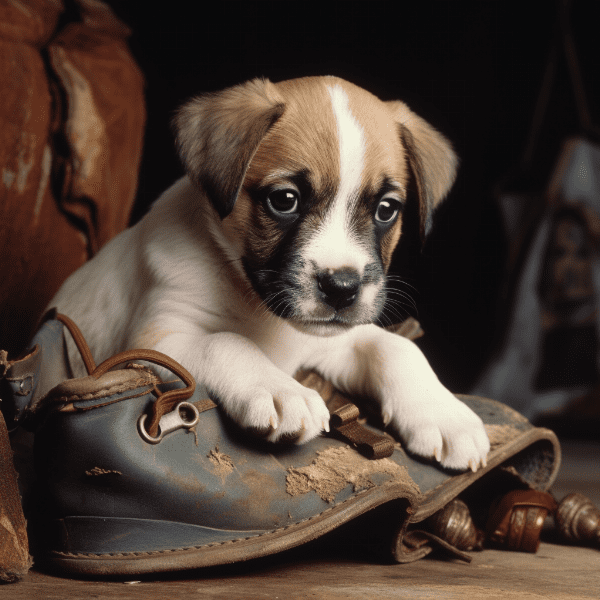
Tips for Preventing Your Puppy from Chewing on Walls
Preventing your puppy from chewing on walls requires a combination of management strategies and training techniques. Here are some tips to help you prevent destructive chewing in your puppy:
Provide Appropriate Chew Toys
One of the most effective ways to prevent your puppy from chewing on walls is to provide them with appropriate chew toys. Look for toys that are specifically designed for puppies and can withstand their chewing.
Redirect Your Puppy’s Chewing
When you catch your puppy chewing on walls, redirect their attention to an appropriate chew toy. Use positive reinforcement techniques such as treats and praise to encourage them to chew on the toy instead.
Use Bitter Spray or Deterrents
Bitter sprays and other deterrents can be effective in preventing puppies from chewing on walls. These sprays contain a bitter taste that discourages puppies from chewing on inappropriate items.
Avoid Punishment
Punishing your puppy for chewing on walls is not an effective solution. Instead, focus on positive reinforcement techniques to encourage appropriate chewing behavior.
Seek Professional Help
If your puppy’s chewing behavior is severe or does not improve with these tips, consider seeking professional help from a veterinarian or a certified dog trainer.
By implementing these tips, you can prevent your puppy from chewing on walls and redirect their chewing to appropriate items, ensuring their safety and happiness.
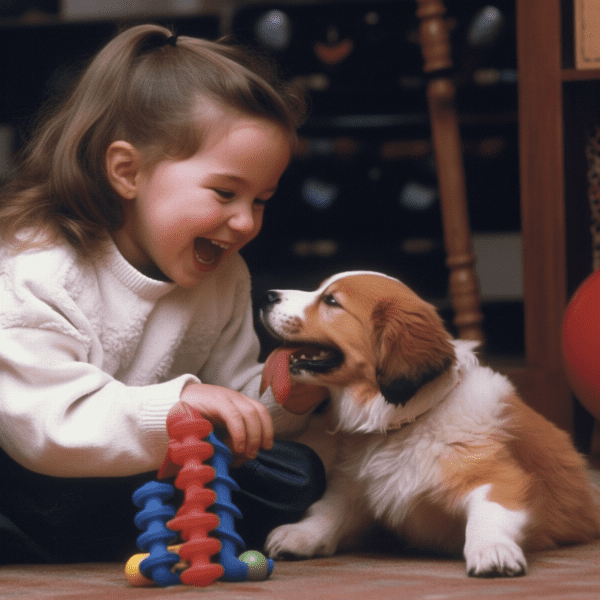
Redirecting Your Puppy’s Chewing to Appropriate Toys
Redirecting your puppy’s chewing behavior to appropriate toys is essential in preventing them from damaging your home’s walls and other inappropriate items. Here are some tips to help you redirect your puppy’s chewing behavior:
Provide a Variety of Chew Toys
Providing your puppy with a variety of chew toys can help to redirect their chewing behavior to appropriate items. Experiment with different textures and flavors to find toys that your puppy enjoys.
Keep Chew Toys Accessible
Make sure that your puppy’s chew toys are easily accessible and readily available. This will encourage them to chew on these toys instead of inappropriate items like walls or furniture.
Rotate Toys
Rotating your puppy’s toys can help to keep them engaged and interested in their toys. Consider introducing new toys regularly to keep your puppy’s interest in their toys.
Use Puzzle Toys
Puzzle toys are a great way to redirect your puppy’s chewing behavior while also providing them with mental stimulation. These toys require your puppy to figure out how to get a treat or toy out of the puzzle, keeping them occupied and engaged.
Consider Frozen Treats
Frozen treats like frozen carrots or peanut butter stuffed Kongs can provide your puppy with a tasty and appropriate chewing option. The cold temperature can also help to soothe sore gums and teeth during the teething phase.
Redirecting your puppy’s chewing behavior to appropriate toys takes time and patience. By providing your puppy with a variety of chew toys, using positive reinforcement techniques, and rotating toys regularly, you can help to prevent destructive chewing in your puppy.
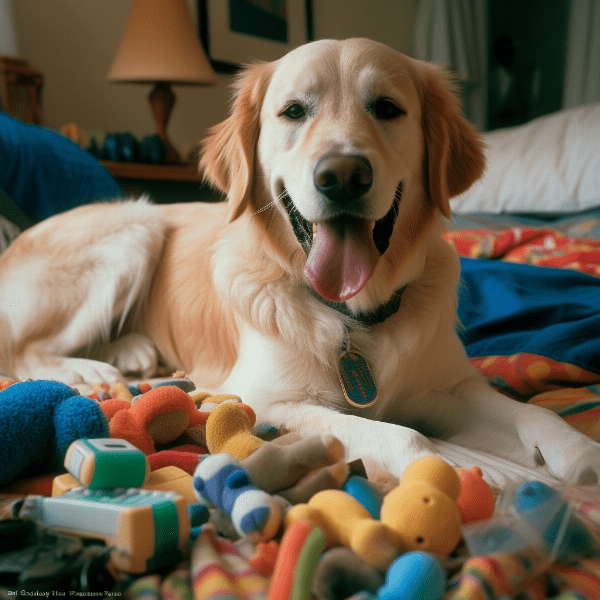
Crate Training as a Solution to Wall Chewing
Crate training can be an effective solution to prevent wall chewing in puppies, as it provides them with a safe and comfortable space to rest and play. Here are some tips to help you crate train your puppy:
Choose the Right Crate
Choose a crate that is appropriate for your puppy’s size and breed. The crate should be large enough for your puppy to stand up, turn around, and lie down comfortably.
Make the Crate Comfortable
Make the crate a comfortable and inviting space for your puppy by adding soft bedding, a few toys, and treats. This will help your puppy associate the crate with positive experiences.
Gradually Introduce Your Puppy to the Crate
Introduce your puppy to the crate gradually, allowing them to explore it at their own pace. Start by leaving the crate door open and placing treats inside, then gradually encourage your puppy to spend more time in the crate.
Establish a Routine
Establishing a routine for crate training can help your puppy feel more comfortable and secure in their crate. Set a schedule for meals, playtime, and rest time, and make sure your puppy has plenty of time outside of the crate for exercise and socialization.
Monitor Your Puppy
Monitor your puppy’s behavior while they are in the crate to ensure that they are comfortable and not showing signs of stress or anxiety. If your puppy is showing signs of distress, such as whining or barking, try to address the cause of their distress or consult with a veterinarian or certified dog trainer.
Crate training can be an effective solution to prevent wall chewing in puppies, as long as it’s done correctly and with patience and positive reinforcement. By choosing the right crate, making it comfortable, gradually introducing your puppy to the crate, using positive reinforcement, establishing a routine, and monitoring your puppy’s behavior, you can successfully crate train your puppy and prevent destructive chewing in your home.
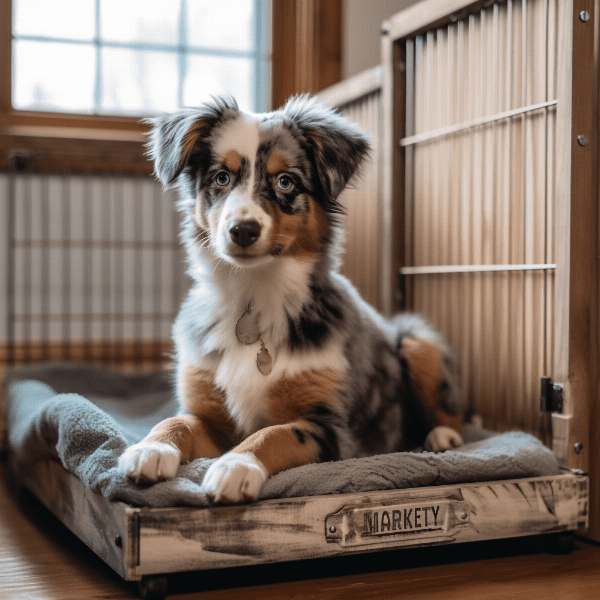
Consistency and Positive Reinforcement: Key to Success
Consistency and positive reinforcement are the key to successfully preventing your puppy from chewing on walls and redirecting their behavior to appropriate toys. Here are some tips to help you achieve consistency and positive reinforcement:
Develop a Plan
Develop a plan that includes strategies for preventing destructive chewing, redirecting your puppy’s behavior, and providing appropriate toys and mental stimulation. Stick to the plan consistently, and make adjustments as needed.
Use Positive Reinforcement
Positive reinforcement is the most effective way to encourage your puppy to engage in appropriate chewing behavior. Use treats, praise, and playtime to reward your puppy for chewing on appropriate toys and avoiding destructive chewing.
Be Patient
Changing your puppy’s chewing behavior takes time and patience. Avoid punishing your puppy for destructive chewing and focus on positive reinforcement techniques.
Avoid Reinforcing Negative Behaviors
Avoid reinforcing negative behaviors such as destructive chewing by not giving your puppy attention when they engage in this behavior. Instead, redirect their behavior to appropriate toys and reward them for chewing on these toys.
Address Underlying Issues
If your puppy’s chewing behavior persists despite your efforts, consult with a veterinarian or certified dog trainer. There may be underlying health or behavioral issues that need to be addressed.
Consistency and positive reinforcement are the keys to successfully redirecting your puppy’s chewing behavior and preventing destructive chewing in your home. By developing a plan, using positive reinforcement, being patient, avoiding reinforcing negative behaviors, staying consistent, and addressing underlying issues, you can successfully train your puppy and keep them safe and happy.
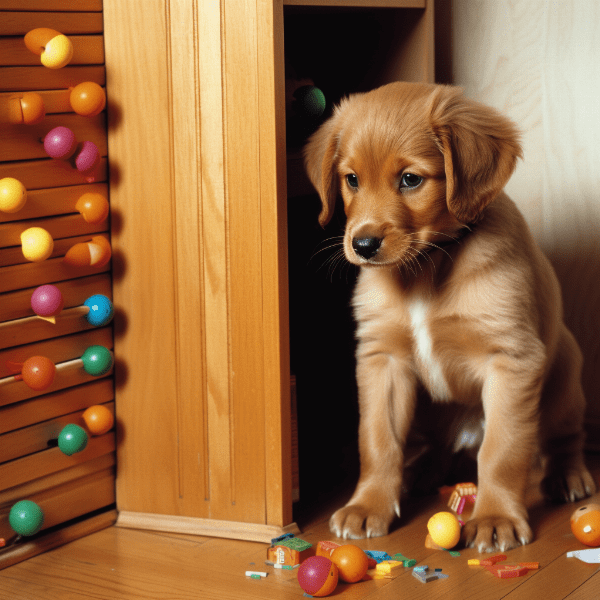
When to Seek Professional Help for Your Puppy’s Chewing
While most cases of destructive chewing in puppies can be addressed with consistent training and positive reinforcement techniques, there are times when seeking professional help is necessary. Here are some signs that it may be time to seek professional help for your puppy’s chewing:
Excessive Chewing
If your puppy is engaging in excessive chewing behavior, despite your efforts to redirect their behavior and provide appropriate toys, it may be a sign of an underlying health or behavioral issue.
Aggressive Chewing
Aggressive chewing, where your puppy is destroying items at a rapid pace, can be a sign of anxiety or stress. This behavior can also cause serious harm to your puppy if they ingest inappropriate items, such as electrical wires or toxic substances.
Chewing Despite Adequate Exercise
If your puppy is still engaging in destructive chewing behavior despite getting enough exercise and mental stimulation, it may be time to seek professional help.
Ingestion of Inappropriate Items
If your puppy is ingesting inappropriate items such as paint, plaster, or other hazardous materials, it’s crucial to seek immediate veterinary attention. This can cause serious health problems that require emergency treatment.
Lack of Progress
If your puppy’s destructive chewing behavior is not improving despite your efforts and consistent training, it may be time to seek professional help from a certified dog trainer or a veterinarian.
In conclusion, seeking professional help for your puppy’s chewing behavior is essential in addressing underlying health or behavioral issues and ensuring your puppy’s safety and happiness. If you notice excessive or aggressive chewing, ingestion of inappropriate items, lack of progress despite consistent training, or other concerning behaviors, consult with a professional to develop a plan to address the issue.
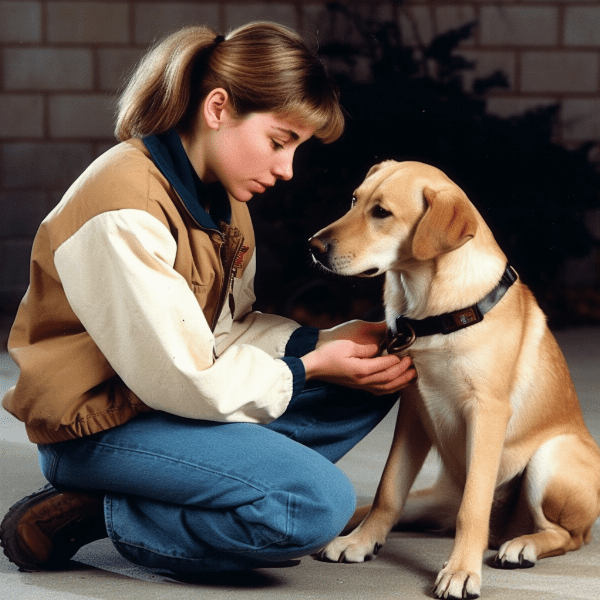
Common Mistakes to Avoid When Stopping Puppy Chewing
Stopping puppy chewing requires patience, consistency, and positive reinforcement. However, there are some common mistakes that puppy owners make that can hinder their progress. Here are some mistakes to avoid when stopping puppy chewing:
Punishing Your Puppy
Punishing your puppy for chewing on walls or other inappropriate items can be counterproductive. Instead of stopping the behavior, punishment can make your puppy anxious or stressed, leading to more destructive behavior.
Not Providing Enough Exercise and Stimulation
Boredom and lack of stimulation can contribute to destructive chewing behavior in puppies. Make sure your puppy is getting enough exercise and mental stimulation through playtime, walks, and training sessions.
Not Providing Appropriate Chew Toys
Providing appropriate chew toys is essential in redirecting your puppy’s chewing behavior. Make sure your puppy has access to a variety of chew toys that are appropriate for their age and breed.
Inconsistency in Training
Inconsistency in training can confuse your puppy and make it harder to redirect their chewing behavior. Stick to a consistent plan, and avoid giving in to your puppy’s demands for attention or inappropriate chewing behavior.
Allowing Access to Inappropriate Items
Allowing your puppy access to inappropriate items such as shoes, socks, or other household items can reinforce destructive chewing behavior. Keep these items out of your puppy’s reach and provide appropriate toys instead.
Stopping puppy chewing takes time and patience, and avoiding these common mistakes can help you achieve success in redirecting your puppy’s behavior. By avoiding punishment, providing enough exercise and stimulation, supervising your puppy, providing appropriate chew toys, being consistent in training, and avoiding access to inappropriate items, you can prevent destructive chewing behavior in your puppy and keep them safe and happy.

Conclusion: Your Puppy Can Learn to Stop Chewing Walls
Preventing destructive chewing behavior in puppies requires patience, consistency, and positive reinforcement. By understanding the reasons behind your puppy’s chewing behavior, providing appropriate chew toys, supervising your puppy, and using positive reinforcement techniques, you can successfully redirect your puppy’s behavior and prevent damage to your home’s walls and other inappropriate items.
Remember to avoid common mistakes such as punishment, inconsistency in training, and allowing access to inappropriate items. Instead, focus on providing enough exercise and mental stimulation, using a crate for safe confinement, and seeking professional help if necessary.
With time and patience, your puppy can learn to stop chewing walls and other inappropriate items. By providing them with appropriate chew toys, redirecting their behavior, and using positive reinforcement, you can ensure your puppy’s safety and happiness in your home.
